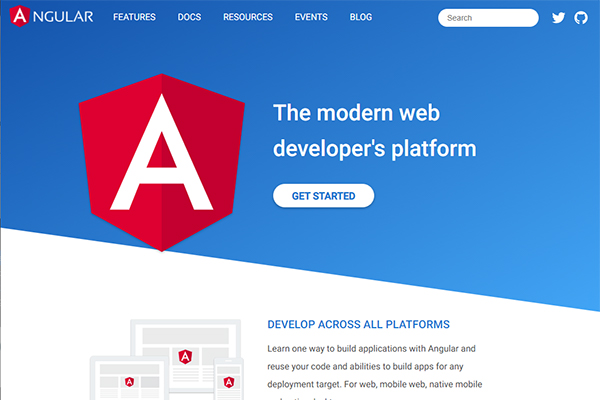What Is Angular

 Angular is an open-source web framework widely used to build dynamic applications for the web. Angular is a front-end framework for building the interface with which app users interact. It was developed by Google. Read on to learn more about this platform and its benefits.
Angular is an open-source web framework widely used to build dynamic applications for the web. Angular is a front-end framework for building the interface with which app users interact. It was developed by Google. Read on to learn more about this platform and its benefits.
What Is Angular Used For
 Angular is often used to develop single page web applications (SPAs). It’s written in TypeScript, a superset of JavaScript created and maintained by Microsoft. With Angular, you can use HTML as the template language for your app code.
Angular is often used to develop single page web applications (SPAs). It’s written in TypeScript, a superset of JavaScript created and maintained by Microsoft. With Angular, you can use HTML as the template language for your app code.
Angular was first introduced in 2009 and since then it has evolved a lot to become one of the most popular frameworks for designing beautiful and dynamic web apps. The first version of Angular was called AngularJS. Today, Angular has reached its 6th iteration.
What is Angular – Advantages
Angular is a valuable web development framework for many teams and companies around the world. Writing JavaScript code tends to require a lot of copy-pasting. Angular speeds up the process, reducing the amount of repetitive work by providing JavaScript stacks that developers can use.
While Angular is not the only front-end framework around, it has a number of important benefits.
- Makes Testing Easier – With Angular, developers can build apps and websites whose performance and functions can be tested quickly and monitored effectively.
- Allows for Code Splitting – Angular enables end-users to load only the code they need rather than all the code, which leads to speed and performance benefits.
- Templates Increase Your Productivity – The template syntax Angular provides makes it easier for developers to create new UIs compared to some other frameworks.
- Allows for Cross Platform Development – With Angular, you can build not only native mobile apps but also desktop apps for Windows, Mac, as well as Linux.
- Effective Code Generation – Writing code in Angular is an effective process because the code is optimized for JavaScript virtual machines.
What Can You Build with Angular?
 Angular is a versatile framework that enables you to create a host of different apps and websites across platforms. Let’s take a closer look at the different types of apps you can create with this powerful framework.
Angular is a versatile framework that enables you to create a host of different apps and websites across platforms. Let’s take a closer look at the different types of apps you can create with this powerful framework.
- Web Apps – Web apps are apps hosted on online servers that users can access across a variety of devices without having to install them on their devices first. For example, a music or video streaming service.
- Hybrid Mobile Apps – Hybrid mobile apps run on smartphones, tablets, and other mobile devices. Unlike mobile web apps, they can process JavaScript and render HTML code without using the browser per see. Instead, they use the browser engine. These types of apps rely on web technologies to run.
- Websites – Web developers also use Angular to build websites. Over the years, many popular websites have been built with this framework, including PayPal, Upwork, Netflix, UPS, Sears, AT&T, Apple Support, as well as a host of Google websites like Google.org and Google Cloud.
- Desktop Applications – As already noted, Angular can help developers bring to life cross-platform desktop apps for the most popular operating systems. When it comes to desktop apps, Angular is often used alongside Electron.
What is Angular – Limitations to Angular
Angular takes time to learn. Also, it has rather limited search engine optimization (SEO) options. But these are not deal-breakers, which is why so many developers chose this platform.
One thing to keep in mind is that Angular was built with large, complex projects in mind—it may not be the ideal platform for small projects.
What is Angular – The Bottom Line
Angular is a powerful web and app development framework equipped to deal with serious projects. It’s also one of the best maintained around and is backed by a large community of users, which makes finding solutions and workarounds to problems fairly easy. If you’re doing web or mobile app development, you want to consider Angular.
